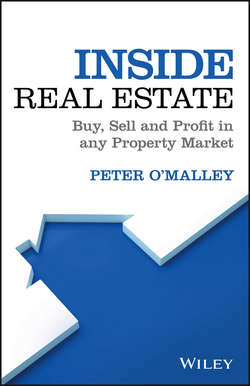Читать книгу Inside Real Estate - O'Malley Peter - Страница 8
На сайте Литреса книга снята с продажи.
PART I
Mastering property
The real estate game
2 The modern real estate firm
ОглавлениеNo industry stays static or immune from change. In real estate we have seen the ongoing development of more sophisticated business models and marketing strategies. So what has changed?
Today's agency tends to be larger. Some firms, with supersized sales teams that tout for Vendor Paid Advertising (VPA), inject millions of dollars into marketing their brand and message. It's all about getting as many listings as possible.
Home sellers are usually unaware that the primary objective of many real estate agents when selling this VPA is building the firm's profile, rather than selling your home. As will be made clear throughout this book, expensive newspaper and internet advertisements do very little to improve a vendor's chance of selling. But you pay for it nonetheless.
When a consumer entrusts the sale of their home to a supersized firm, they often take comfort in the notion that they have a large company behind them. Their expectation is that the company is more likely to have superior management and internal processes for managing staff and the sales process.
Many consumers who have experienced problematic sales campaigns are alarmed to discover their salesperson is not representing a large firm, in which management holds the agent's performance to account. Their agent is actually the CEO of a micro-company and pays a percentage of their commission to ‘the mother ship'. The management of the apparently large firm with a high-profile brand has little, if any, ability to hold these salespeople to account.
Agencies are structured this way in order to avoid the payroll tax and superannuation payments that would apply to permanent staff. This ‘contract' arrangement of outsourcing makes a big difference to their bottom line and adds to the perception of the firm's size. It gives these salespeople autonomy, but leaves them to fund their own running costs. All is not what it seems from the outside.
A practical example of how this structure plays out to the consumer's detriment can be found in the non-sharing of data between salespeople operating within the same firm. You may list your $3 million home with a supersized agency that has sold a number of similar homes in recent times. You are unaware, however, that one particular sales agent at the firm sold those homes and that you have unknowingly listed with one of their colleagues, believing the same service will be provided.
As an uninformed consumer, you have just jumped to the unfortunate conclusion that the salesperson you hired will be contacting everyone on the agency's list, including the underbidders left over from those other $3 million sales. It is reasonable to believe this would provide an important pool of genuine buyers to market your home to.
To your astonishment, however, a month into the campaign it becomes clear that these underbidders have not been contacted. On questioning the agent, you learn that those potential buyers are on their colleague's database and your agent does not have access to them. It's a shock to learn that agents in the same firm will not share their buyer databases with each other.
It then dawns on you that you have listed, not with a super-brand, but with a fledgling ‘one-man band' trading under the super-brand's name. This now common business structure means many real estate agents are in fiercer competition with their colleague at the next desk than they are with rival agents down the road.
Given this structure, let's deal with the question of what agents are likely to steer you into when it comes to those ever-present advertising charges and requirements. Charging exorbitant fees for VPA is not just the domain of supersized agencies.
The internet has been the dominant real estate platform for more than a decade, yet millions of property consumers have not yet sold using online methods. It is these consumers who are more likely to ask real estate agents if they should advertise in the newspaper. Why? Because generally they have more understanding of newspaper marketing (even though it is now redundant) than they do of modern online marketing.
Unfortunately, many real estate agents lead clients to believe that spending large sums on online advertising is beneficial and commensurate to the cost of newspaper advertisements. Agents advise sellers to transition to real estate portal advertising – where the agent benefits from rebates and/or brand exposure.
Given the power and reach of Google and other search engines, the sophistication of modern web-based databases and the amount consumers pay agents in sales commissions, inflated website advertising has now become just one of many different marketing tools available to consumers. But you need to assess whether your money is actually helping to sell your home or merely assisting the agent's lead generation and self-promotion.
Pay to advertise your home – don't inadvertently pay to advertise your agent's brand.
